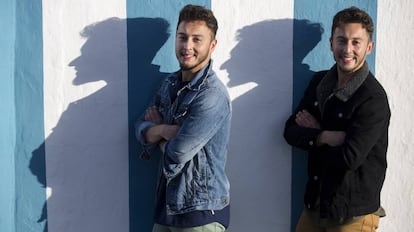From Lucía and Natalia to Lucas and Mateo: The Spanish transgender twins beating back stereotypes
The brothers from Málaga have taken their story public via a series of YouTube videos, in which they hope to raise awareness about issues of transsexualism

Lucas and Mateo Ocón Zayas, 29-year-old twin brothers from the town of Torre del Mar, Málaga, have had their fill of memorable experiences. But there is one day that stands out: November 11, 2015. That was when they received their new Spanish identity cards (DNI) with their full names. “I’m legally a man now,” thought Mateo, who until that moment went by the name Natalia. Lucas felt the same as he left behind his birth name, Lucía. Lucas and Mateo are transsexual twins who have decided to make their story pubic to raise awareness about the transgender community and help normalize transsexualism.
The twins hope their story will help other transgender people
They were born as girls but identified as boys from an early age. “At five years old I told my mother I was a boy,” Mateo explains. The twins are like two raindrops – it's difficult for those who don't know them to tell them apart and they speak with an almost identical voice. Their bond was so strong they didn’t need words to tell one another that they both had been born in the wrong body. “We never said it out loud, but we knew we were the same, we were certain of it,” says Mateo, who was born a minute after his brother. The twins have no other siblings and live with their parents. There were some hints that they felt the same way – for example, when they talked about looking “physically” like boys when they grew up and growing beards just like their father.
The transgender twins started their hormonal transition in July 2013, and have now shared their story on a YouTube channel called Twin Brothers. In the first uploaded video, they introduce themselves as Natalia and Lucía. They started making videos in April of that same year, a day before cutting off their long hair. A few months before, they had visited the Gender Identity Department at the Public Hospital of Málaga, where they were advised to start taking on a more masculine appearance.
Up until then, the twins were intentionally feminine. “We didn’t want to be masculine girls, I felt like I was in costume. Not everyone saw it this way, but we did,” Mateo explains. They would dress in heels and wore makeup until they were 24 years old. When they started the sex-change process, they encountered a few obstacles with their psychologist, who seemed to believe that because they were twins, one could influence the other to change their gender identity.
They continued the process at a private clinic, where they underwent mastectomy procedures in August 2015. They are currently on a waiting list for hysterectomies at a public health department. Developing breasts was what always worried Lucas the most. When he hit puberty, he remembers being on the beach with his male friends and feeling jealous when they took off their shirts. “Why can’t I have that?” he thought.
I’ve never felt discriminated against, although I know that this happens
Mateo Ocón Zayas
The twins both have degrees in Labor Relations. They started their University studies in Seville, and finished them in Málaga. Lucas is unemployed at the moment and is looking for work. Mateo, meanwhile, has worked for three years at a supermarket chain, where his brother had also been employed for some time. “I’ve never felt discriminated against. I know that this occurs, but it’s never happened to me,” Mateo says.
“It’s because these are people who have known us our whole lives,” he continues, explaining that they have been supported by their parents, friends and their community in Torre del Mar. “They saw us playing soccer when we were seven years old. Frankly they were more surprised when they saw us putting on high heels and lipstick than now,” Mateo adds. They both laugh. They have a wide circle of friends but at the moment neither has a girlfriend. The twins talked to their parents about the sex change when they first started their transition. “It's not that they were going to throw us a party, it was a shock, but they are happy because we are happy [...] My mother admits that she has always known,” concludes Mateo.
In the videos, the twins explain how they have transitioned step by step into Lucas and Mateo. The goal of the videos is to make society more “free and just,” so that people can respect each other despite sharing different views. In particular, they hope by sharing their own experiences they can help young transgender people who don’t know what to do. “People need to be educated, they need to be taught,” says Lucas.
English version by Laura Rodríguez.
Tu suscripción se está usando en otro dispositivo
¿Quieres añadir otro usuario a tu suscripción?
Si continúas leyendo en este dispositivo, no se podrá leer en el otro.
FlechaTu suscripción se está usando en otro dispositivo y solo puedes acceder a EL PAÍS desde un dispositivo a la vez.
Si quieres compartir tu cuenta, cambia tu suscripción a la modalidad Premium, así podrás añadir otro usuario. Cada uno accederá con su propia cuenta de email, lo que os permitirá personalizar vuestra experiencia en EL PAÍS.
¿Tienes una suscripción de empresa? Accede aquí para contratar más cuentas.
En el caso de no saber quién está usando tu cuenta, te recomendamos cambiar tu contraseña aquí.
Si decides continuar compartiendo tu cuenta, este mensaje se mostrará en tu dispositivo y en el de la otra persona que está usando tu cuenta de forma indefinida, afectando a tu experiencia de lectura. Puedes consultar aquí los términos y condiciones de la suscripción digital.








































